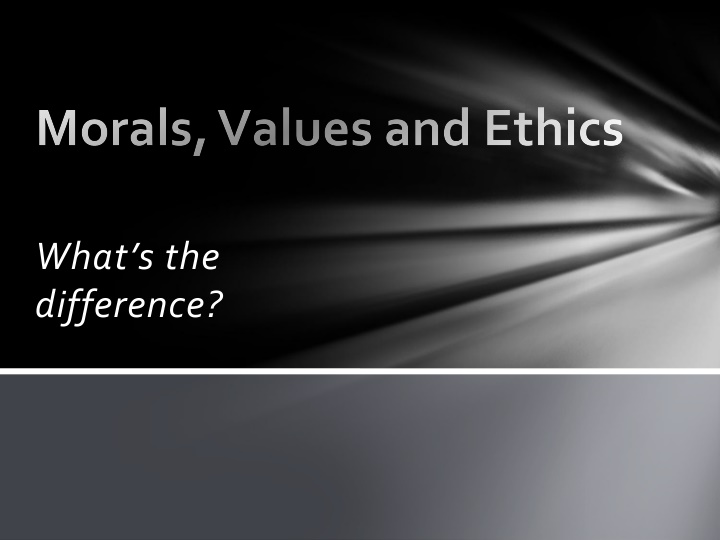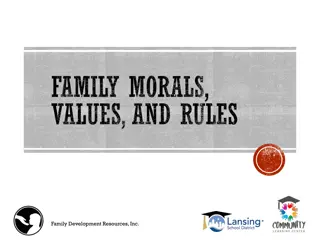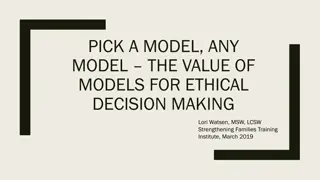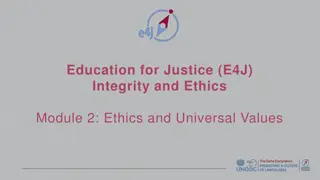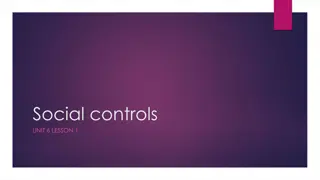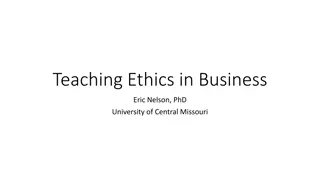Morals, Values, and Ethics: Key Differences and Implications
Morals are about right and wrong, values guide decision-making on good and bad, while ethics are standards prescribing proper conduct. Your morals shape your values, which in turn influence your ethical behavior. Moral development involves personal and interpersonal dimensions. Explore the Heinz dilemma scenario to further grasp these concepts.
Download Presentation

Please find below an Image/Link to download the presentation.
The content on the website is provided AS IS for your information and personal use only. It may not be sold, licensed, or shared on other websites without obtaining consent from the author.If you encounter any issues during the download, it is possible that the publisher has removed the file from their server.
You are allowed to download the files provided on this website for personal or commercial use, subject to the condition that they are used lawfully. All files are the property of their respective owners.
The content on the website is provided AS IS for your information and personal use only. It may not be sold, licensed, or shared on other websites without obtaining consent from the author.
E N D
Presentation Transcript
Morals, Values and Ethics What s the difference?
Morals Definition: Motivation based on ideas of right and wrong Morals are more about good and bad than other values. We thus judge others more strongly on morals than values. A person can be described as immoral, yet there is no word for them not following values.
Values Values are the rules by which we make decisions about right and wrong, should and shouldn't, good and bad. They also tell us which are more or less important, which is useful when we have to trade off meeting one value over another. Dictionary.com defines values as: n : beliefs of a person or social group in which they have an emotional investment (either for or against something); "he has very conservatives values"
Ethics Ethics refers to well based standards of right and wrong that prescribe what humans ought to do, usually in terms of rights, obligations, benefits to society, fairness, or specific virtues. Ethics point to standards or codes of behavior expected by the group to which the individual belongs
Morals, Values and Ethics What s the difference? So, one way to think about is this: Your morals give you a sense of what is right and wrong You use this sense of right and wrong to develop (or understand) your values Your morals and values influence your ethics: how you act/respond to given situations based on the standards or codes of behavior expected by the group to which the you belongs
What is Moral Development Moral development involves thoughts, feelings, and behaviors regarding standards of right and wrong Moral development consists of intrapersonal and interpersonal dimensions
Scenario 1 In Europe, a woman was near death from a special kind of cancer. There was one drug that the doctors thought might save her. It was a form of a radium that a druggist in the same town had recently discovered. The drug was expensive to make, but the druggist was charging ten times what the drug cost him to make. He paid $200 for the radium and charged $2,000 for a small dose of the drug. husband, Heinz, went to everyone he knew to borrow the money, but he could only get together about $1,000 which is half of what it cost. He told the druggist that his wife was dying and asked him to sell it cheaper or let him pay later. But the druggist said: No, I discovered the drug and I m going to make money from it. Heinz got desperate and broke into the man s store to steal the drug for his wife. The sick woman s Should the husband have done that? Why or why not?
Scenario 2 Heinz broke into the laboratory and stole the The next day, the newspaper reported the break-in and theft. Brown, a police officer and a friend of Heinz remembered seeing Heinz last evening, behaving suspiciously near the laboratory. Later that night, he saw Heinz running away from the laboratory. drug. Should Brown report what he saw? Why or why not?
Scenario 3 Officer Brown reported what he saw. Heinz was arrested and brought to court. If convicted, he faces up to two years jail. Heinz was found guilty. Should the judge sentence Heinz to prison? Why or why not?
Kohlberg's Moral Ladder Post conventional Conventional Pre-conventional Ideally people should progress through the 3 stages as part of normal development
Kohlberg's Moral Ladder Pre-conventional (approx. Birth to 9) Stage 1: Punishment-Obedience Orientation Stage 2: Individualism and Exchange Orientation Conventional ( approx. 9 to 20 ) Stage 3: Interpersonal Relationships Orientation Stage 4: Law and Order Orientation Post-conventional (20+ to maybe never ) Stage 5: Social Contract Orientation Stage 6: Universal Ethical Principle Orientation
Levels of Moral Development Level 1: Pre-conventional Morality Stage 1: Punishment-Obedience Orientation Stage 2: Individualism and Exchange Orientation
Summary of Stage 1: Punishment-Obedience Orientation Individual obeys rules in order to avoid punishment. The concern is for self Will I get into trouble for doing (or not doing) it? . Good behavior is associated with avoiding punishment. Possible Stage 1 responses to Heinz Dilemma: Heinz should not steal the drug because he might be caught and sent to jail. Heinz should steal the drug because if he doesn t then his wife might be angry at him for not helping her.
Summary of Stage 2: Individualism and Exchange Orientation Individual conforms to society s rules in order to receive rewards. The concern What s in it for me? . Still egocentric in outlook but with a growing ability to see things from another person s perspective. Action is judged right if it helps in satisfying one s needs or involves a fair exchange. Possible Stage 2 responses to Heinz Dilemma: YES: It is right for Heinz to steal the drug because it can cure his wife and then she can cook for him. NO: The doctor scientist had spent lots of money and many years of his life to develop the cure so it s not fair to him if Heinz stole the drug.
Levels of Moral Development Level 2: Conventional Morality Stage 3: Interpersonal Relationships (good girl/good boy) Stage 4: Law and Order Orientation
Summary of Stage 3: Interpersonal Relationships Orientation (good girl / good boy) Individual behaves morally in order to gain approval from other people. The concern is What will people think of me? and the desire is for group approval. Right action is one that would please or impress others. This often involves self-sacrifice but it provides the psychological pleasure of approval of others.
Summary of Stage 3: Interpersonal Relationships Orientation (good girl / good boy) Possible Stage 3 responses to Heinz Dilemma: YES: Heinz should steal the drug. He probably will go to jail for a short time for stealing but his in-laws will think he is good husband. YES: Brown, the police officer should report that he saw Heinz behaving suspiciously and running away from the laboratory because his boss would be pleased. NO: Officer Brown should not report what he saw because his friend Heinz would not be pleased. NO: The judge should not sentence Heinz to jail for stealing the drug because he meant well he stole it to cure his wife.
Summary of Stage 4: Law and Order Orientation Conformity to authority to avoid censure and guilt. The concern now goes beyond one s immediate group(s) to the larger society to the maintenance of law and order. One s obligation to the law overrides one s obligations of loyalty to one s family, friends and groups. To put it simply, no one or group is above the law.
Summary of Stage 4: Law and Order Orientation Possible Stage 4 responses to Heinz Dilemma: YES: As her husband, Heinz has a duty to save his wife s life so he should steal the drug. But it s wrong to steal, so Heinz should be prepared to accept the penalty for breaking the law. YES: The judge should sentence Heinz to jail. Stealing is against the law. He should not make exceptions even though Heinz wife is dying. If the judge does not sentence Heinz to jail then others may think it s right to steal and there will be chaos in the society.
Levels of Moral Development Level 3: Post-Conventional Morality Stage 5: Social Contract and Individual Rights Orientation Stage 6: Universal Ethical Principal Orientation
Summary of Stage 5: Social Contract and Individual Rights Orientation Individual is concerned with individual rights and democratically decided laws. The concern is social utility or public interest. While rules are needed to maintain social order, they should not be blindly obeyed but should be set up (even changed) by social contract for the greater good of society. Right action is one that protects the rights of the individual according to rules agreed upon by the whole society.
Summary of Stage 5: Social Contract and Individual Rights Orientation Possible Stage 5 responses to Heinz Dilemma: YES: Heinz should steal the drug because everyone has the right to life regardless of the law against stealing. Should Heinz be caught and prosecuted for stealing then the law (against stealing) needs to be reinterpreted because a person s life is at stake. NO: The doctor scientist s decision is despicable (bad or unpleasant) but his right to fair compensation (for his discovery) must be maintained. Therefore, Heinz should not steal the drug.
Summary of Stage 6: Universal Ethical Principle Orientation Individual is entirely guided by his or her own conscience. The concern is for moral principles an action is judged right if it is consistent with self-chosen ethical principles. These principles are not concrete moral rules but are universal principles of justice, reciprocity, equality, and human dignity. Possible Stage 6 response to Heinz Dilemma: Heinz should steal the drug to save his wife because preserving human life is a higher moral obligation than preserving property.
To Summarize 1. In the preconventional level, (stages one and two) one operates first out of fear of punishment, then in terms of satisfying one's own needs. This stage largely applies to children. 2. In the conventional level (stages three and four) one no longer looks to one's own needs or fears, but adopts the rules and conventions of the majority -- moral acts are those that preserve social norms, "doing one's duty", etc. The primary moral goal is to please others, whether they be friends or a larger social group. 3. In the post-conventional level (stages five and six) the standards one now abides by are no longer those of the community, but ones that the agent believes apply to all persons -- universal principles.
But Wait Kohlberg's scale was tremendously influential, and is still considered the most important ethical model by many. But researcher Carol Gilligan began to notice that on Kohlberg's scale, women rarely progressed beyond the second (conventional) level. Moreover, as Gilligan began to look at other developmental models (those of Freud, Piaget, and Erickson), she noticed that women always came out deficient or deviant.
WHY? Kohlberg only studied males Gilligan studied females Found out some surprising things: a) women conceptualize ethics differently from men b) that their different voice is an equally legitimate way to view ethics
Differences Between Men and Women Gilligan s study showed: Women tended much more often than the men of Kohlberg s studies to see the moral life in terms of care rather than justice, in terms of responsibility rather than rights. Whereas men see things as moral issues when they involve competing claims about rights, women see problems as moral when they involve the suffering of other people.
Differences Between Men and Women Men see the primary moral imperative as centering around treating everyone fairly, Women see that moral imperative as centering around caring about others and about themselves. Men typically make moral decisions by applying rules fairly and impartially, Women are more likely to seek resolutions that preserve emotional connectedness for everyone.
Differences Between Men and Women Similarly, men tend to look back and to judge whether a moral decision was correct or not by asking whether the rules were properly applied, whereas women tend to ask whether relationships were preserved and whether people were hurt.
Fundamental Difference The quality of the relationships, rather than the impartiality of the decisions, is the standard for evaluating decisions for women
Responsibility The meaning of responsibility also changes. For men, being responsible is primarily a matter of being answerable for actions, for having followed (or failed to follow) the relevant rules. For women, the focus of responsibility is in taking care of the other person, including (and sometimes especially emphasizing) their feelings. Moreover, it is directed toward what the other person actually feels and suffers, not what someone/anyone" (i.e., an abstract moral agent) would experience. Responsibility is directed toward real individuals, not to abstract codes of conduct.
The Sense of Self Men are much more likely to see the self in terms of autonomy, freedom, independence, separateness, and hierarchy. Rules guide the interactions among people, and roles establish each individual s place in the hierarchy. In contrast, women tend to see the self in terms of relatedness, interdependence, emotional connectedness, and responsiveness to the needs of others. Instead of depending on rules as men do, women are much more likely to show an immediate response to the plight of the other person.
The Sense of Self Women experience themselves, first and foremost, as connected; The self IS its network of relationships.
Kinds of Ethics 3 Principles of Ethics Personal Professional Global
Personal Ethics Personal ethics might also be called morality, since they reflect general expectations of any person in any society, acting in any capacity. These are the principles we try to instill in our children, and expect of one another without needing to articulate the expectation or formalize it in any way.
Personal Ethics Concern for the well-being of others Respect for the autonomy of others Trustworthiness & honesty Willing compliance with the law (with the exception of civil disobedience) Basic justice; being fair Refusing to take unfair advantage Benevolence: doing good Preventing harm
Unethical Behavior Among Individuals Lying to your spouse about how much money you spent. Lying to your parents about where you were for the evening. Stealing money from the petty cash drawer at work. Lying on your resume in order to get a job. Talking about a friend behind his back. Taking credit for work you did not do. Cheating on a school paper by copying it off the Internet. Taking $20.00 out of your friend's wallet when he is sleeping. Using your position of power at work to sexually harass someone. Selling a house and not disclosing known defects to the buyers. Selling a car and lying about the vehicle's accident history.
Professional Ethics Individuals acting in a professional capacity take on an additional burden of ethical responsibility. For example, professional associations have codes of ethics that prescribe required behavior within the context of a professional practice such as medicine, law, accounting, or engineering. Even when not written into a code, principles of professional ethics are usually expected of people in business, employees, volunteers, elected representatives and so on.
Professional Ethics Impartiality; objectivity Openness; full disclosure Confidentiality Due diligence / duty of care Fidelity to professional responsibilities Avoiding potential or apparent conflict of interest
Unethical Professional Behavior Doctors, dentists and lawyers dating their clients. Not telling a patient his true diagnosis because the physician didn't know the details of the diagnosis. A dentist preforms unnecessary procedures on a patient in order to receive the insurance payment. Using a patient as a teaching tool for students for long periods of time without the permission of the patient or patient's family. A lawyer represents parties on both sides of a legal transaction.
Unethical Business Behavior: Dumping pollutants into the water supply rather than cleaning up the pollution properly. Refusing to give an employee a final paycheck for hours worked after the employee leaves the company. Not paying an employee for all of the hours worked. Incorrectly classifying an employee as an independent contractor and not as an employee in order to reduce payroll taxes and avoid purchasing unemployment and workers' compensation insurance. Engaging in price fixing to force smaller competitors out of business. Using bait and switch or false advertising tactics to lure customers in or convince them to buy a product. Refusing to honor a warranty claim on a defective product.
Global Ethics Global ethics are the most controversial of the three categories, and the least understood. Open to wide interpretation as to how or whether they should be applied, these principles can sometimes generate emotional response and heated debate. Concentric Circles of Allegiance
Global Ethics Global justice (as reflected in international laws) Society before self / social responsibility Environmental stewardship Interdependence & responsibility for the whole Reverence for place
Are all ethical judgments subjective or culturally relative? To say that a judgment is subjective is to say that it may not generally be shared by others. To say that a judgment is culturally relative is to say that it holds in one culture but not for others.
Are all ethical judgments subjective or culturally relative? Judgments like Parents should take good care of their children are in fact generally shared, and maintained in all cultures. To be a parent means that there is another person for whom you are responsible. So at least some ethical judgments are objective and universal, not subjective or culturally relative.
Are all ethical judgments subjective or culturally relative? Can you think of any ethical judgments which are NOT Subjective or Culturally relative? In other words, is there any action that could be considered right or wrong in ALL cases there would be no It depends
Are there any tests which determine what is right and wrong? Ethics is complicated, and there are no absolute rules for justifying moral judgments. But there are some simple tests that often reveal that something immoral is going on:
Are there any tests which determine what is right and wrong? I. The Golden Rule Test. Suppose you are considering doing something that affects other people in a negative way. Ask, How would I like it if others did this to me? If you wouldn t like the act done to you, it is probably immoral to do it to others.
Are there any tests which determine what is right and wrong? II. The Universal Generalization Test. Suppose that you are considering doing an act called A. Ask, What if everybody did A ? If the result of everybody doing A would be against your interests, A is probably immoral.
